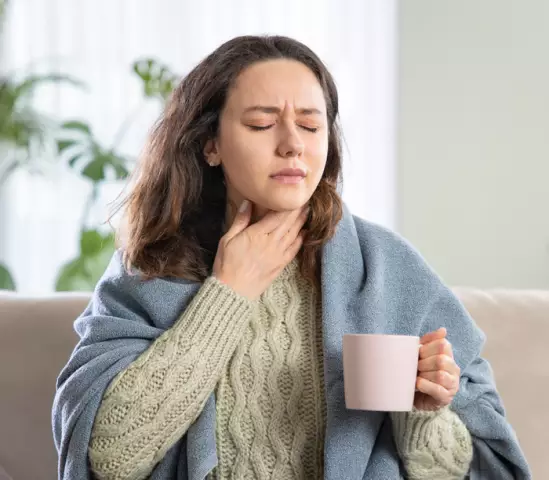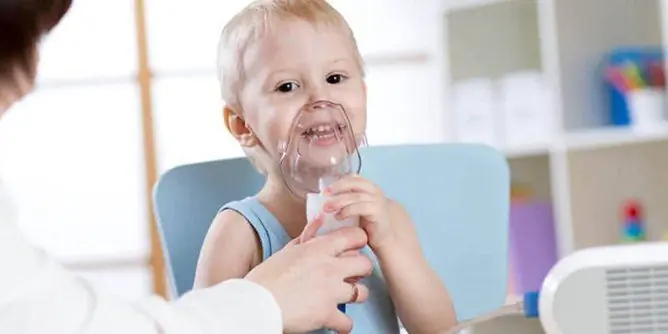- Author Rachel Wainwright wainwright@abchealthonline.com.
- Public 2023-12-15 07:39.
- Last modified 2025-11-02 20:14.
Laryngitis
Laryngitis is an inflammatory process on the mucous membrane of the larynx and vocal cords of any etiology. Laryngitis can be a consequence of colds or infectious diseases such as whooping cough, scarlet fever, measles. Laryngitis can also be caused by overstrain of the larynx (loud conversation, singing, screaming), hypothermia, mouth breathing (especially with dusty or cold air).

In modern medical practice, the following types of laryngitis are distinguished:
- Catarrhal - the mildest form, in which there is hoarseness, slight cough, sore throat;
- Hypertrophic - more pronounced, with increased symptoms. On the vocal cords, the formation of tissue nodules, the size of a match head, is possible;
- Atrophic - the mucous membrane inside the larynx is thinned, the back wall of the pharynx is affected. It manifests itself as a painful cough, hoarse voice, dry mouth;
- Diphtheria is a consequence of the spread of infection from the tonsils to the larynx. The mucous membrane of the larynx is covered with a white coating, which, when separated, can block the airways at the level of the vocal cords;
- Tuberculosis is a consequence of the spread of tuberculosis from the lungs to the larynx. Seals in the form of tubercles are formed in the tissues;
- Syphilitic - a complication of syphilis. Ulcers and plaques form in the larynx (second stage), which later turn into scars that deform the vocal cords and larynx (stage 3).
Acute laryngitis
Acute laryngitis usually occurs due to the activation of pathogenic microflora located in the larynx, under the influence of various factors:
- Acute respiratory diseases (flu, scarlet fever, whooping cough);
- Severe hypothermia;
- Overstrain of the vocal cords when screaming or long loud conversation, singing;
- Irritation with nicotine;
- Long-term exposure to dust, gas;
- Alcohol abuse.
Acute laryngitis, symptoms:
- General deterioration in health - fever, headache, perspiration and sore throat;
- Swelling and hyperemia of the laryngeal mucosa;
- Redness and thickening of the vocal cords, incomplete closure;
- A noticeable swelling of the folds of the vestibule, a sharp redness of the mucous membrane;
- The formation of dark red dots on the mucous membrane of oozing blood;
- Change in voice from significant hoarseness to complete disappearance.
With isolated acute laryngitis, the symptoms are similar, but appear in specific foci.
Chronic laryngitis
Chronic laryngitis is a chronic inflammatory process of the laryngeal mucosa, submucosa and intralaryngeal muscles.
Chronic laryngitis, symptoms:
- Hoarseness;
- Rapid fatigue of the voice;
- Periodic tickling;
- Coughing.
The emergence of pathological processes in the larynx can be triggered by recurring acute laryngitis, chronic inflammation of the nasopharynx, regular allergic reactions or systematic negative effects on the larynx region, before the formation of chronic laryngitis. Symptoms can manifest themselves depending on the age and form of inflammatory processes, with varying intensity.
The main symptom of chronic laryngitis is a clearly changed voice, since chronic laryngitis develops mainly in the intercranial region and in the area of the vocal folds.
Laryngitis in children
Laryngitis in children is a great danger, especially in the first years of life, when immunity is just being formed, and the body's resistance is low. A sharp increase in symptoms is the main danger of laryngitis in children. A seemingly healthy child falls asleep, and in the middle of the night, a barking cough and shortness of breath may appear. Severe edema of the laryngeal mucosa for a short time leads to a significant narrowing of the respiratory lumen. Failure to take urgent action can result in suffocation.
At the first manifestations of symptoms of laryngitis in children, it is necessary to call an ambulance. Before her arrival, you can alleviate the condition of a sick child by opening a window so that the air in the room is fresh, with an increased oxygen content. It is imperative to keep the child in a sitting position, soothing him in order to normalize the breathing rate. It is advisable to humidify the air in any way - leave a boiling kettle, hang up wet towels, put open containers with freshly boiled water.
After the doctor's visit, all his appointments should be strictly followed. A child with laryngitis should not be left alone, without adult supervision, especially at night. It is necessary to ensure that the child's breathing is exclusively nasal, the air must enter the larynx warm, purified and humidified. It is important to observe the voice mode, in order to avoid stress on the damaged mucous membrane of the larynx, the child should speak quietly and a little.
Laryngitis treatment
The main direction of laryngitis treatment is to eliminate the cause of its formation. To ensure peace of the mucous membrane of the larynx for the period of treatment of laryngitis, it is necessary:
- Try not to talk for some time, while talking in a whisper is not recommended, since whispering leads to irritation of the vocal cords;
- Quit smoking and drinking alcohol;
- Exclude spices, hot seasonings, sour, bitter dishes from the diet;
- Food and drink should not be very hot or cold;
- The air in the apartment should be constantly ventilated for additional oxygenation.
The process of treating laryngitis is the use of warm liquid in large quantities, inhalation, gargling, warming the neck with compresses or warm bandages. For the entire period of treatment, it is recommended to soak your feet in a warm bath to drain blood from a sore throat. Drinking alkaline mineral water is beneficial. In more difficult cases, it is possible to prescribe drugs - antitussives, antihistamines, Lugol's solution in glycerin to lubricate the throat.
If all prescriptions are followed, acute laryngitis is cured within 7-10 days. If you do not follow the rules and appointments, there is a high probability of the transition of acute laryngitis into a chronic form.

In case of chronic laryngitis, it is necessary to undergo regular examination, according to the results of which the attending physician determines the individual methods of treating laryngitis for each specific case. Possible appointments of oil and alkaline inhalations, electrophoresis in the larynx, other physiotherapeutic procedures and drug treatment. In some particularly difficult cases, surgical intervention is necessary.
With a predisposition to laryngitis, you should:
- Adhere to a healthy lifestyle;
- Carry out hardening procedures;
- Eat right, excluding hot and spicy seasonings;
- Do not eat food and drinks in the cold;
- Take good care of the vocal cords;
- Always ventilate when you are in dirty rooms.
Compliance with these rules will help reduce the incidence of acute laryngitis and reduce the likelihood of its transition to chronic laryngitis.
YouTube video related to the article:
The information is generalized and provided for informational purposes only. At the first sign of illness, see your doctor. Self-medication is hazardous to health!






